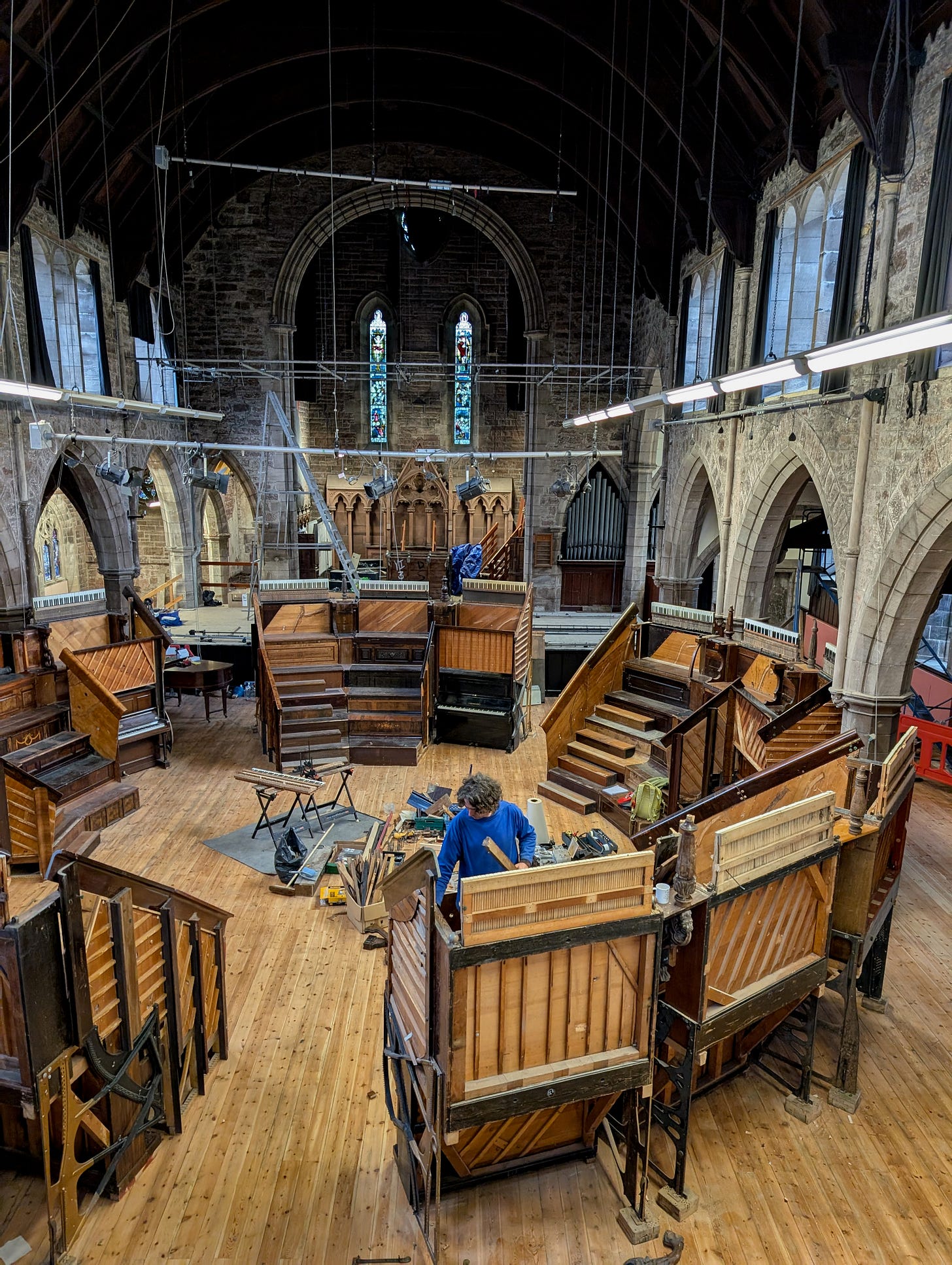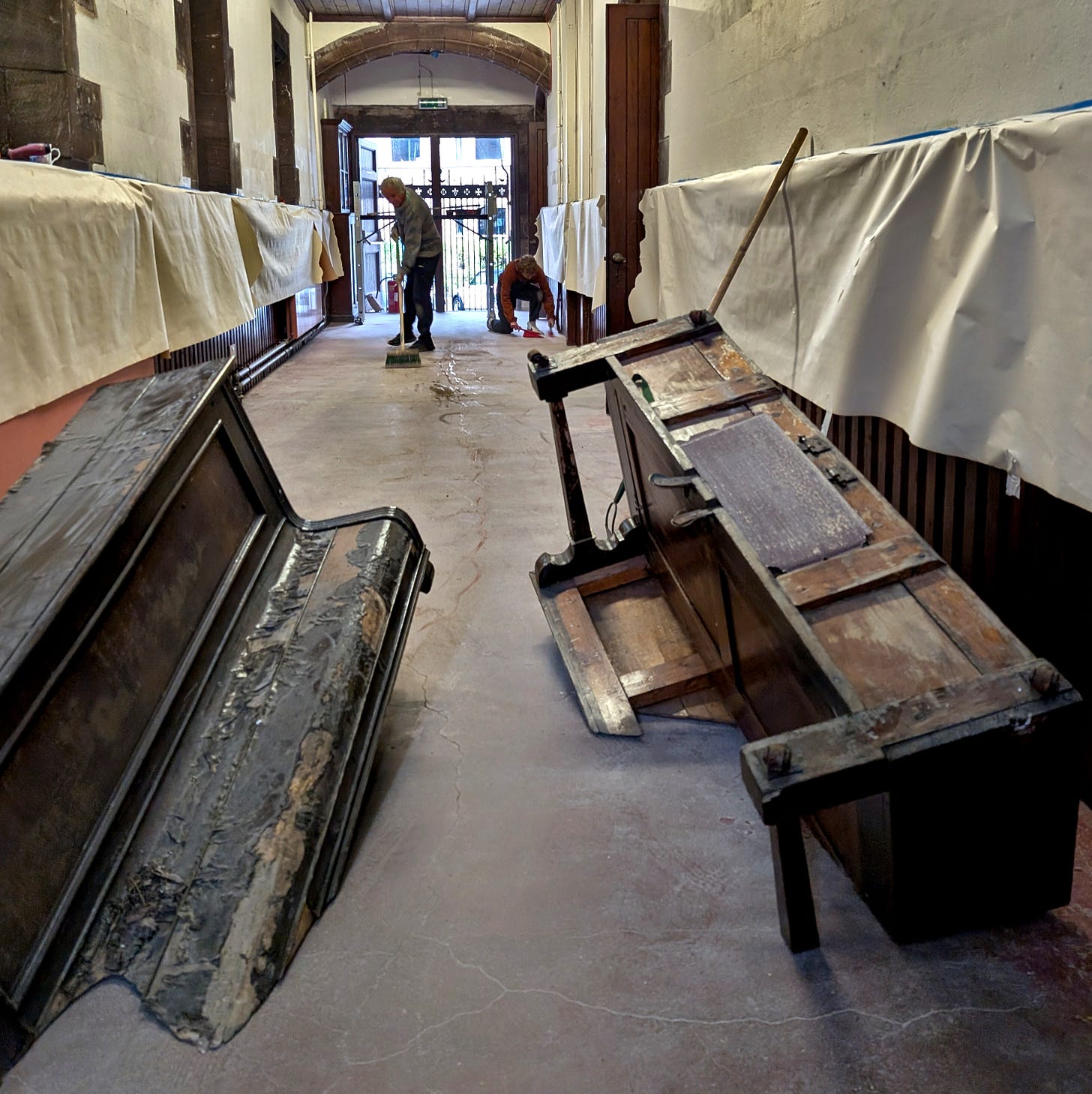‘Like a huge, walnut, mahogany, musical hug’
Welcome to the (new) Pianodrome
It’s been described as “a huge, walnut, mahogany, musical hug.” A patchwork of rich, dark, polished timber, arranged into a ring of stepped seating. It’s immediately obvious that this isn’t just any old wood; the occasional panel with ornate carvings gives a clue, those armrests with wheels on the end, they look so familiar… but the ivory and ebony keys standing upright above the highest row makes it clear.
This is a Pianodrome - a wooden amphitheatre, created entirely from pianos which would otherwise be in landfill.
Believe it or not this is the third pianodrome that the team of parent organisation Pianodrome CIC has built, and the second to live permanently in Edinburgh. The Pianodrome in Granton is already a busy community music venue, and from 24 - 26 October the team will host a “soft, but grand” opening of their second permanent venue in St Oswald’s Community Centre in Bruntsfield.
How did this all come about?
The beginnings of the Pianodrome began in 2016 when Tim Vincent-Smith, artist and musician, and one of five co-directors of Pianodrome CIC, needed to move a piano. Marvelling at how professional piano-mover Gerry Love and his team wheeched his second-hand piano up four flights of stairs, Tim asked Gerry if there were ever any pianos going spare. “That was when I discovered this effectively endless stream of pianos in Edinburgh, going to the dump,” said Tim.
Tim took on a handful of Gerry’s spare pianos, and began plotting an interactive sculpture. At the same time, he was performing with his band S!NK which often performs in the round (with the audience on all sides of the performers). “I had this circle of pianos, and I just thought this is the perfect place for our band to play,” Tim said.
While Tim, along with co-director Emily Martinelli, started working on prototypes for piano-based seating, bandmate and co-director Matt Wright started looking for funding. The Pianodrome CIC was born, and won funding to create a Pianodrome to sit in the Botanic Gardens for the Fringe in 2018.
Seven years later the Pianodrome team have worked in the Old Royal Highschool, the Leeds International Piano Competition, and in the US, as well as setting up their long-term venues in Granton and Bruntsfield.
Creating Community
The pianodrome has always been about more than just a beautiful structure. “There’s this circular dynamic which breaks apart [divide between] the audience and the big famous person. You see each other and you see how many faces there are and you see the diversity in everyone.” says Matt. “That’s a pattern we hold in all of our work, remembering that we’re all humans, and that we don’t need to be looking elsewhere for our entertainment and community.”
This ethos is perfectly demonstrated by the monthly piano share. Anyone and everyone is invited to sit at the piano in the centre, and play what they have been practicing. Piano sharers can range from professionals testing out new material to children playing the first piece they’ve ever learned.
The organisation doesn’t just do music either; the Granton Pianodrome has hosted everything from music and poetry, to climate events and art workshops.
The team have big plans for turning the new St Oswald’s venue into a rich and open community space too. While the Granton venue will be staying open, the second space brings new opportunities; ”this is the first time that we’ll have a properly licensed space where we can put on shows whenever we want, and play here whenever we want,” says Matt.
The team are hoping to start a Babydrome programme of music sessions for parents and toddlers. They’d like to see everything from community choirs rehearsals to film production to yoga classes in the new Pianodrome. In the long term the Pianodrome team would like to have a community cafe in one corner of the space, use the old church stage as a multi-use rehearsal or performance space- the church eaves could host art exhibitions. But the team also wants to wait and hear what local community members would like to see. “Doing this soft opening is really exciting, we want people to turn up and see that there’s space; physical space but also time-wise space; and we can offer people the opportunity to fill those spaces,” says Matt.
The Bruntsfield Pianodrome will be kicking off with some exciting musical performances too. Local pianist and Fringe-favourite Will Pickvance will be the Pianodrome’s first “Pianist in Resonance,” carrying out a more spontaneous, community-focussed version of an artist’s residency. The programme for the rest of 2026 is filling up fast, including two album launches, international touring artists, workshops with performers, medieval carols by candlelight as the festive season approaches.
Reducing waste
When Pianodrome CIC was founded, Gerry Love was paying for around ten pianos every month to be burned. Nowadays they are sent to landfill, at a cost of £60 per piano. It was a no-brainer- for Gerry, the Pianodrome team, and for the planet- to take on these pianos and give them a new life. To date, the social enterprise has rescued over 600 pianos, the vast majority of which were on their way to landfill. But with each pianodrome requiring around 40 pianos, what to do with the rest of them?
Just under three years ago the Pianodrome team started their Adopt a Piano scheme. Only unplayable pianos are deconstructed and included in the pianodromes, those which can be revived are put up for adoption. This isn’t just a second-hand piano shop, the team wants to make sure that these pianos won’t end up en route back to the dump again. Potential adopters have to come to the showroom, choose a piano, play the piano at least once, and then complete an adoption form. “It’s like a dog and cat home… it’s a commitment,” says Tom Nelson, co-director of Pianodrome CIC who helps to run the piano adoption scheme. The financial commitment to adopt a piano, though, is minimal- while a second-hand, refurbished piano sells for a least £1000, Pianodrome only asks for a donation from adoptive piano parents.
Tom and co-director Shona MacArthur also organise a weekly piano-fixing workshop in the Granton space, where volunteers can help to fix up the newly arrived pianos in need of a little TLC. Tom explains that fixing a piano is not as complicated as many people think; as we speak he is addressing some water damage in the 85 hammers which create music by hitting strings inside the piano. “It’s really fiddly, but you do the same thing 85 times so once you’ve done one piano, you know it really well,” he says.
Tom is also piloting a plan to go out and fix pianos in people’s homes, helping people to hold on to their pianos rather than letting go of them when they break. “They need a little bit of maintenance, and then they’re good to go again for another 50 years or so,” says Tom.
The most circular space in town
Circles seem to be a big feature of the Pianodrome. Not only the physically round audience format, which is such an important part of the egalitarian performance space that the organisation hosts. Rescuing and re-using hundreds of decades-old, hand crafted masterpieces so that they can continue to make music, is an excellent and uniquely fun incarnation of the kind of circular economy principles we need in our single-use, high-waste society. But the reason why this beautiful, eccentric, creative structure has lasted longer than one Fringe season in the Botanics is because of the community of musicians, makers, volunteers and audiences that has been created around it.
As Tom says, “this could all be an elaborate ruse to get together with like-minded people.”
For more information about events and getting involved, you can sign up to the Pianodrome mailing list here.





